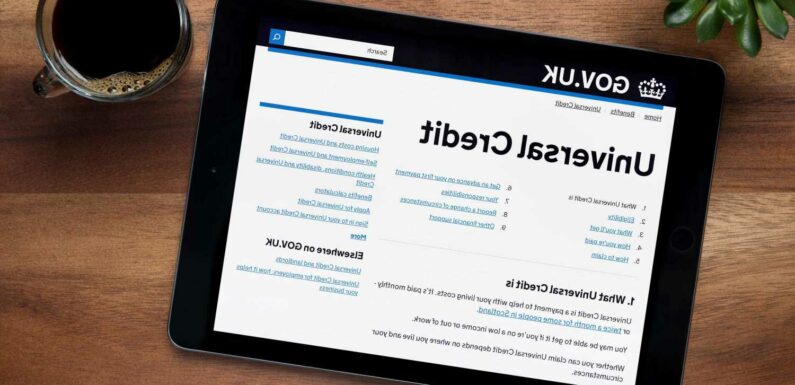
MILLIONS of households are being warned to look out for a letter in the post or risk their benefit payments being stopped.
The move to the new welfare system where you get Universal Credit is starting for many people on legacy benefits.
Everyone on six so-called legacy benefits will be moved over to Universal Credit by the end of 2024, the government has said.
It is estimated around 2.6million people are still on these old-style benefits.
The move, called Managed Migration, began in May and came after a successful pilot in Harrogate in July 2019.
People affected by the shift will be sent a letter from the Department for Work and Pensions, which will guide them on what to do to retain financial support.
MOST READ ON UNIVERSAL CREDIT
Six things those on Universal Credit can get for FREE this month
12 key dates affecting your finances this year
Around 500 people in Medway and Bolton have already been sent letters, followed by households in Truro, Falmouth and Harrow in West London.
Last month, people in Northumberland are being urged to look out for a letter in the post from the Department for Work and Pensions.
The Department for Work and Pensions said around 250 people in region would receive a letter.
But there are still millions of people left to make the switch over to Universal Credit.
Most read in Money
Live updates as Jeremy Hunt faces tough questions from MPs over tax cut fiasco
Martin Lewis gives urgent energy warning to Brits after budget shake-up
Workers set for £330 pay boost within weeks as National Insurance cut to go ahead
Price of booze WILL rise as Chancellor reverses price cuts
Consumer expert Martyn James said: "These are stressful times for people on limited incomes or in need of state support, so the news that your benefits are shifting to a new method of payment might be particularly stressful.
"While the switch to Universal Credit might be of concern, it's vital to keep an eye out on the post for your migration letter so you don't miss out.
"But if in doubt, call the office that pays your benefits to find out more about what happens next."
The six legacy benefits being replaced by Universal Credit are:
- Working Tax Credit
- Child Tax Credit
- Income-based Jobseeker’s Allowance
- Income Support
- Income-related Employment and Support Allowance
- Housing Benefit
Not everyone will make the switch before the end of the year, but some claimants will.
Many benefits claimants will move over naturally through a change of circumstances during that time, for instance if they have a baby or change jobs.
Who is affected and will I be better off?
Many will move over between now and 2024 naturally through a change of circumstances, like moving home or having a baby.
It's estimated that 1.4million will be better off on Universal Credit.
A further 300,000 will see no change to how much they get, while around 900,000 will be worse off under Universal Credit.
Anyone worse off will get transitional payments to top up their income to the same amount.
Around 600,000 will get transitional payments to top up their income – but face potentially having their payments frozen in future.
But transitional payments are only available through managed migration.
If you chose to move over and are worse off you won't get them, so you need to check carefully if you'll be better off and wait to be moved if not.
A benefits checker can help you understand if you'll be better off or not.
Using an online benefits calculator can help you compare and are free and easy to use from charities such as Turn2Us and EntitledTo, and it's also worth asking them for advice.
Once you move over, you won't be able to go back to legacy benefits.
The majority of those who are expected to get transitional payments – around 400,000 – are claiming Employment Support Allowance (ESA).
Around 100,000 are on tax credits while fewer than 50,000 each on other legacy benefits are expected to be affected.
Examples of those who may be entitled to less on Universal Credit according to the government include:
- Households getting ESA who and the Severe Disability Premium and Enhanced Disability Premium
- Households with the lower disabled child addition on legacy benefits
- Self-employed households who are subject to the Minimum Income Floor after the 12 month grace period has ended
- In-work households that worked a specific number of hours (eg lone
parent working 16 hours claiming Working Tax Credits) - Households receiving tax credits with savings of more than £6,000 (and up to £16,000)
Eventually anyone who hasn't moved over to Universal Credit will be notified that they will be switched.
If you do find you're better off on Universal Credit you can start making a claim straight away.
But beware that your benefits will stop, and you will have a five week wait for your first Universal Credit payment, which could leave you short.
You can get an advance, which is interest-free, but you'll pay this back in instalments from future payments which will reduce how much you get each month.
Moving to Universal Credit can affect other benefits you get, so check this carefully too.
For example if you're getting council tax help you'll need to tell your local authority you've switched to Universal Credit.
Read More on The Sun
Man slammed by wife for booking surprise holiday without baby – people are divided
I made the best poached eggs ever using my Air Fryer – here’s how I did it
Meanwhile, we list six things thousands of people on Universal Credit can get for free this month.
Plus, millions of households could be eligible for hundreds in bill support this winter – we explain all the help that you may be entitled to.
Source: Read Full Article








